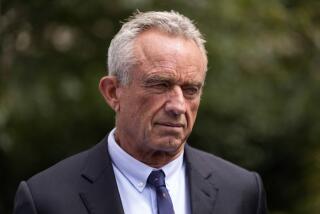Political bickering follows Caroline Kennedy’s decision to drop Senate bid
NEW YORK AND SAN FRANCISCO — Caroline Kennedy’s abrupt withdrawal from the New York Senate contest sparked an extraordinary back-and-forth Thursday between rival camps, pitting the erstwhile candidate against the governor she once courted. But the question remained: Why did she quit?
A person close to Gov. David Paterson said Kennedy botched her campaign for the seat vacated by Hillary Rodham Clinton and cited allegations regarding taxes, domestic help and Kennedy’s marriage, though he offered no proof. The governor’s office later rejected the assertion.
People close to Kennedy brushed aside those charges and said it was devotion to her family that drove her decision, and nothing more.
The Associated Press said Thursday night that New York authorities could not find any problems with Kennedy’s tax records. In a December interview, she denied any nanny problem and said her husband, Edwin Schlossberg, was very supportive.
The guessing about Kennedy’s motivations continued even as it appeared that Paterson, a fellow Democrat, had made his choice. The New York Times reported early today that he had settled on Rep. Kirsten Gillibrand, a second-term House Democrat from upstate New York. A formal announcement is set for midday.
Kennedy’s withdrawal in a one-sentence statement issued just after midnight Wednesday stunned political insiders in New York and Washington and prompted speculation from one coast to the other.
The Paterson camp seized upon Kennedy’s announcement -- and confusion that swirled for several hours beforehand about whether or not she was dropping out -- as evidence she was not up to the job.
The person close to Paterson would present the governor’s version of events only on condition of anonymity. The source said Kennedy called the governor twice on Wednesday and made contradictory comments about her interest in serving in the Senate, then surprised the governor by issuing a terse statement hours later citing unspecified “personal reasons” for removing herself from consideration.
Individuals close to Kennedy, 51, said she made clear her desire to withdraw when she called Paterson on Wednesday, and the governor urged her to take time to reconsider. Paterson’s camp said that was not true.
Neither Kennedy nor Paterson spoke to reporters Thursday, but the governor issued a statement saying the decision “was hers alone.”
The open seat and its attendant drama resulted from Clinton’s confirmation as secretary of State.
Kennedy, the daughter of the late President Kennedy, launched an unusually aggressive campaign to take Clinton’s place. She hired a team of veteran political advisors, paid a high-profile visit to upstate New York -- modeled on the “listening tour” Clinton conducted in her first run for office -- and collected support from powerful backers.
But if Kennedy scuffed her once-unsullied image, Paterson may have hurt himself too. He has been faulted for drawing out the selection process, sending mixed signals and appearing to excessively relish attention.
“The governor played with it too much, and for too long,” said Joseph Mercurio, a veteran New York political consultant. “This was a two-month soap opera,” said Douglas Muzzio, a political analyst at Baruch College.
The unusually harsh and personal attacks on Kennedy that emanated from Paterson’s camp may have been an effort to deflect criticism. But apparently there were second thoughts.
On Thursday evening Paterson’s office issued a statement in which he called Kennedy “a friend” and said that no “information gathered during this selection process created a necessity for any candidate to withdraw.”
“Speculation to the contrary is both inaccurate and inappropriate,” the statement added.
Even with Kennedy in the running, Gillibrand was considered a strong contender. Paterson has a personal and political stake in the choice because he will be up for election in 2010, the same time as the Senate designate. Gillibrand, 42, is a prolific fundraiser and has demonstrated cross-party appeal, winning her House seat in a Republican-leaning district.
--
mark.barabak@latimes.com
--
Erika Hayasaki in New York and Janet Hook in Washington contributed to this report.
More to Read
Sign up for Essential California
The most important California stories and recommendations in your inbox every morning.
You may occasionally receive promotional content from the Los Angeles Times.











